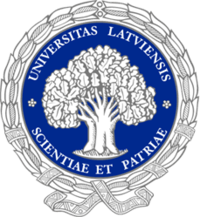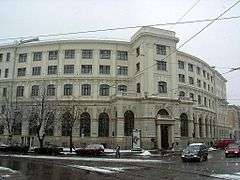University of Latvia
| Latvijas Universitāte | |
 | |
| Latin: Universitas Latviensis | |
| Motto | Scientiae et patriae (For science and fatherland) |
|---|---|
| Type | Public |
| Established | 1919 |
| Rector | Indriķis Muižnieks |
| Students | 14,020 (2014) |
| Undergraduates | 9,680 (2014) |
| Postgraduates | 3536 (2014) |
| 804 (2014) | |
| Address |
Raiņa bulvāris 19, Riga, |
| Affiliations | Campus Europae, Utrecht Network, EUA |
| Website | www.lu.lv |
 | |
The University of Latvia (LU) (Latvian: Latvijas Universitāte) is a state-run university located in Riga, Latvia. It was established in 1919.
The university is ranked 701st–750th in the world,[1] as well as 4th in the Baltic states after the University of Tartu, Tallinn University of Technology, and Vilnius University.[2]
History
The University of Latvia, named at that time "Higher School of Latvia" (Latvian: Latvijas Augstskola) was founded on September 28, 1919 on the basis of the former Riga Polytechnic (founded in 1862). The first rector of the university was chemist Paul Walden. In 1923, this school received its now resumed name – the University of Latvia (Universitas Latviensis).
In the period between 1919 and 1940, the University of Latvia was the greatest center of higher education, science and culture in Latvia. The former building of the Riga Polytechnic on Raiņa bulvāris 19 serves as the university's main building.
In the pre-war years, it was possible to gain higher academic education not only at the University of Latvia, but also at the Latvian State Conservatory and Academy of Arts. Over time, the Latvian University of Agriculture, Riga Stradiņš University, and Riga Technical University separated from the University of Latvia and became well-known centers of education and research in their own right.
With Latvia regaining independence, the Supreme Council of the Republic of Latvia reconfirmed the Constitution of the University of Latvia on September 18, 1991. It stated that the Higher School is "a state establishment of academic education, science and culture which serves the needs of Latvia and people".[3] Alongside the Constitution, the flag, the hymn, the University's emblem, the Rector's chain, and the official garments for the Rector, Vice-Rector and deans were renewed as attributes of the University of Latvia.
The EuroFaculty, created by the CBSS to support reforms at the universities in Tartu, Riga, and Vilnius, was organized with its headquarters at the University of Latvia, 1993–2005.[4]
Enrollment
The University of Latvia offers undergraduate, graduate, and doctoral levels of study and in October 2014 more than 14,000 students, including PhD and exchange students, had enrolled in various study programs.[5] Almost one third of them studied in business and economics related programs.
Organisation

The university consists of 13 faculties:
- Faculty of Biology;
- Faculty of Chemistry;
- Faculty of Physics and Mathematics;
- Faculty of Economics and Management;
- Faculty of Education, Psychology and Arts;
- Faculty of Geography and Earth sciences;
- Faculty of History and Philosophy;
- Faculty of Law;
- Faculty of Medicine;
- Faculty of Humanities;
- Faculty of Social sciences;
- Faculty of Theology;
- Faculty of Computing.
In addition to the university's various faculties and its medical wing, the Riga Medical College (Rīgas Medicīnas koledža), the University of Latvia offers most of the resources traditionally associated with accredited universities, including several libraries, research facilities, study centers, a language school, and a career center.[6]
Institute of Mathematics and Computer Science
The Institute of Mathematics and Computer Science (IMCS) was founded in 1959 as a computer research centre, now consisting of about 200 researchers, assistants, engineers, and software developers.
Amateur Art Activities
The university has a number of amateur choirs, orchestras and dance groups, as well as a student theater.
People
Notable professors and lecturers
- Andris Ambainis, computer scientist
- Mārcis Auziņš, physicist
- Kārlis Balodis, economist
- Konstantīns Čakste, legal theorist
- Jānis Endzelīns, linguist
- Karlis Kaufmanis, astronomer
- Augusts Kirhenšteins, microbiologist
- Eižens Laube, architect
- Jānis Maizītis, lawyer
- Valdis Muktupāvels, ethnomusicologist and doctor of art criticism
- Andrejs Veisbergs, linguist
Notable alumni
- Māris Čaklais, Latvian poet
- Valdis Dombrovskis, Latvian politician, European Commissioner for Economic and Monetary Affairs and the Euro, former Prime Minister of Latvia
- Klāvs Elsbergs, Latvian poet
- Ivars Godmanis, Latvian politician, former Prime Minister of Latvia, MeP
- Uldis Ģērmanis, Latvian historian and writer
- Ivars Kalviņš, Latvian chemist, has worked on the foundation of mildronate
- Guntars Krasts, Latvian politician, former Prime Minister of Latvia, MeP
- Zenta Mauriņa, Latvian writer
- Artis Pabriks, Latvian politician, former Latvian Minister of Foreign Affairs
- Andris Piebalgs, Latvian politician and diplomat, former European Commissioner for Energy
- Ilmārs Poikāns, Latvian AI researcher, hacker
- Einars Repše, Latvian politician, former Prime Minister of Latvia
- Eliyahu Rips, Israeli mathematician
- Aminata Savadogo, Latvian singer, songwriter, finalist in Eurovision Song Contest 2015
- Knuts Skujenieks, Latvian poet, journalist
- Daina Taimiņa, Latvian mathematician
- Guntis Ulmanis, Latvian politician, former President of Latvia
- Jānis Vanags, archbishop of the Evangelical Lutheran Church of Latvia
See also
References
External links
| Wikimedia Commons has media related to University of Latvia. |
Coordinates: 56°57′00″N 24°07′00″E / 56.95°N 24.1167°E